人教版九年级英语重点、难点、考点及疑点注释
人教版九年级英语unit3知识点,单词讲解
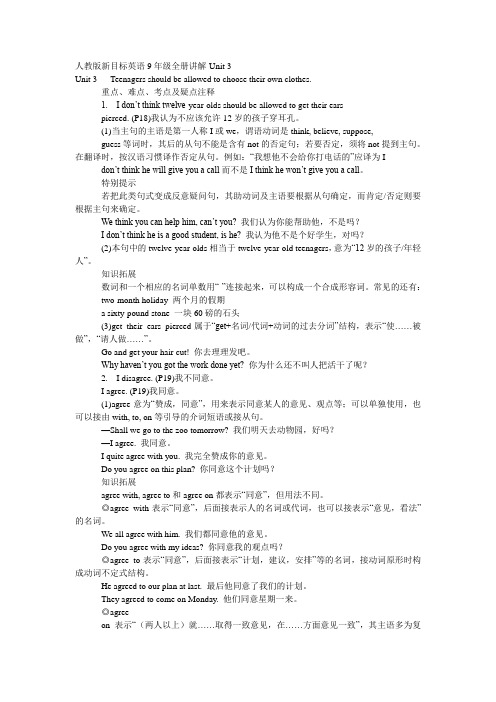
人教版新目标英语9年级全册讲解-Unit 3Unit 3 Teenagers should be allowed to choose their own clothes.重点、难点、考点及疑点注释1. I don’t think twelve-year-olds should be allowed to get their earspierced. (P18)我认为不应该允许12岁的孩子穿耳孔。
(1)当主句的主语是第一人称I或we,谓语动词是think, believe, suppose,guess等词时,其后的从句不能是含有not的否定句;若要否定,须将not提到主句。
在翻译时,按汉语习惯译作否定从句。
例如:“我想他不会给你打电话的”应译为I don’t think he will give you a call而不是I think he won’t give you a call。
特别提示若把此类句式变成反意疑问句,其助动词及主语要根据从句确定,而肯定/否定则要根据主句来确定。
We think you can help him, can’t you? 我们认为你能帮助他,不是吗?I don’t think he is a good student, is he? 我认为他不是个好学生,对吗?(2)本句中的twelve-year-olds相当于twelve-year-old teenagers,意为“12岁的孩子/年轻人”。
知识拓展数词和一个相应的名词单数用“-”连接起来,可以构成一个合成形容词。
常见的还有:two-month holiday 两个月的假期a sixty-pound stone 一块60磅的石头(3)get their ears pierced属于“get+名词/代词+动词的过去分词”结构,表示“使……被做”,“请人做……”。
Go and get your hair cut! 你去理理发吧。
人教版九年级全一册英语知识点归纳

人教版九年级全一册英语知识点归纳PEP九年级英语知识点归纳Unit 1 How can we become good learners?重点:1.研究并掌握用how来询问做某事的方式;2.研究并掌握by+ving来表达做某事的方法。
难点:动名词在句中充当的成分。
知识点:ask for help寻求帮助work with sb.和……一起工作have XXX和……一起对话XXXthe secret to……的秘诀word by word逐字take time花时间word group词组body language肢体语言XXX脸上的表情key words关键词as well也look up查看take notes记笔记XXX.练做某事pen pal笔友keep a XXX记日记make XXX出错increase增长;进步decrease削减;降落practice with sb.和……一起操演XXX依靠whether or not是否pay attention to sth。
/ doing sth.注意某事/做某事for a long time很长一段时间con nect…with…把……和……毗连起来write down写下mind map思惟导图XXX毕生的路程on one’s own单独地bit by bit一点点at once立时,立即It’s a piece of cake.小菜一碟。
It serves you right.你该死。
Use it or lose it.Practice makes perfect.Unit 2 I think that mooncakes are delicious!重点&难点:1.that。
if whether引导的宾语从句;2.感叹句的研究和运用。
知识点:Dragon Boat Festival端五节Spring Festival春节XXX元宵节eat out吃光put on增肥end up最终成为XXX洗去灾祸good luck好运in the shape of以……的形式XXX传统民间故事shot down击落,打垮fly up to飞向call out one’s name喊出或人的名字lay out展示,放置share…with sb.和某人分享……It is a good idea to do sth.做某事是个好主意do…instead做某事来代替play a XXX开……的玩笑dress up打扮haunted house鬼屋think of考虑,考虑warn sb。
九年级上册英语人教版笔记

九年级上册英语人教版笔记一、Unit 1 How can we become good learners?1. 重点单词。
- aloud:adv. 大声地;出声地。
例如:Read aloud so that we can all hear you.(大声朗读以便我们都能听到你。
)- pronunciation:n. 发音;读音。
Your pronunciation is very good.(你的发音很好。
)- patient:adj. 有耐心的;n. 病人。
Be patient with children.(对孩子们要有耐心。
)- expression:n. 表达(方式);表示。
Facial expressions can show our feelings.(面部表情能展示我们的感受。
)2. 重点短语。
- by doing sth.:通过做某事。
We can improve our English by reading English books.(我们可以通过读英语书提高英语。
)- make mistakes:犯错。
Everyone makes mistakes when they learn something new.(每个人在学习新东西的时候都会犯错。
)- look up:查阅;抬头看。
Look up the new word in the dictionary.(在词典里查阅这个新单词。
)3. 重点句型。
- How do you study for a test?(你如何为考试而学习?)- I study by working with a group.(我通过小组合作来学习。
)- The more you read, the faster you'll be.(你读得越多,你就会读得越快。
)二、Unit 2 I think that mooncakes are delicious!1. 重点单词。
人教版九年级英语第十三单元重点、难点、考点及疑点注释

人教版九年级英语第十三单元重点、难点、考点及疑点注释人教版九年级英语第十三单元重点、难点、考点及疑点注释Unit 13 Rainy days make me sad.重点、难点、考点及疑点注释1. I’d rather go to the Blue Lagoon Restaurant... (P102)我宁愿去Blue Lagoon餐厅,……would rather意为“宁愿……”,表示句子主语的愿望、选择,后接省去to的不定式。
He’d rather join you in the English Group. 他宁愿加入到你的英语小组中来。
Which would you rather have, bread or rice? 面包和米饭,你更喜欢哪一个?如果表示“宁愿(可)……也不愿……”则用句型would rather...than...。
在would rather和than后面所连接的两个对比部分一般要一致。
The brave soldier would rather die than give in.那个勇敢的士兵宁死不屈。
He’d rather work than play. 他宁愿工作也不愿玩。
They preferred to die of hunger rather than take his bread.他们宁愿饿死也不愿接受他的面包。
2. Loud music makes me happy. (P103)嘈杂的音乐使我很开心。
Loud music always makes me want to dance. (P103)嘈杂的音乐总是使我想去跳舞。
这两句是动词make的使役用法,make me后分别接了形容词和不定式短语。
make的这种用法常见于以下结构:◎ make+名词(代词)+省略to的动词不定式My parents often make me do some other homework. 我父母常让我做些其他的作业。
人教版九年级英语各单元重难点归纳
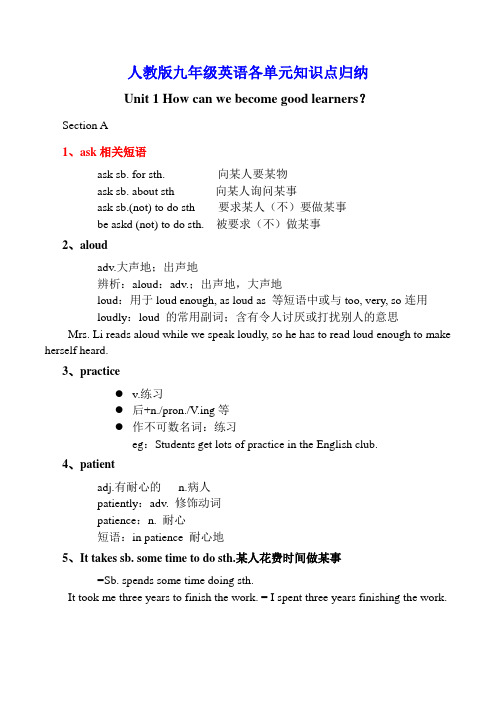
人教版九年级英语各单元知识点归纳Unit 1 How can we become good learners?Section A1、ask相关短语ask sb. for sth. 向某人要某物ask sb. about sth 向某人询问某事ask sb.(not) to do sth 要求某人(不)要做某事be askd (not) to do sth. 被要求(不)做某事2、aloudadv.大声地;出声地辨析:aloud:adv.;出声地,大声地loud:用于loud enough, as loud as 等短语中或与too, very, so连用loudly:loud 的常用副词;含有令人讨厌或打扰别人的意思Mrs. Li reads aloud while we speak loudly, so he has to read loud enough to make herself heard.3、practice●v.练习●后+n./pron./V.ing等●作不可数名词:练习eg:Students get lots of practice in the English club.4、patientadj.有耐心的n.病人patiently:adv. 修饰动词patience:n. 耐心短语:in patience 耐心地5、It takes sb. some time to do sth.某人花费时间做某事=Sb. spends some time doing sth.It took me three years to finish the work. = I spent three years finishing the work.6、the +比较级(+主语+ 谓语),the +比较级(+ 主语+ 谓语):越……,越……eg:The more you eat, the heavier you will be.7、find it + adj.+ to do sth.发现做某事……eg: I find it very interesting to learn English.8、secret:n.秘密;秘诀eg:Neither of them knows the secret.adj.秘密的;保密的eg:We discovered a secret passage behind the wall.短语keep the secret =keep sth. to oneself 保守秘密the secret to/of ...:……的秘诀/ 秘密keep sth secret 对某事保密9、expression:n.表情;表示express:v.及物动词;表达;表露express...to sb.:向某人表达……eg: I find it difficult to express my meaning to the old Frenchman.10、辨析invent:发明(从无到有的东西)discover:发现(本来就已经存在,但不为人知的事物)find:找到或发现11、look up:查阅;抬头看宾语的位置:名词可前可后eg: Look up the word in the book, and you will know its meaning.look+pron.+ upeg: Please look them up in the dictionary carefully.look up to:仰慕eg: Many young people look up to Yao Ming as their hero.look短语look down on sb. 小瞧某人look for 寻找look out 小心look around 环顾四周look over 仔细检查12、by后加名词、代词或动词-ing形式by+地点名词,表方位在……旁边eg:We live by the sea.by+时间名词,到……时为止(已发生某事);最晚、不迟于……谓语可用完成时eg:I must be in bed by ten o’clock.by+交通工具、交通方式,通过……,由……,乘……eg:by train / taxi / bike/ boat / sea / water辨析by:乘某种交通工具I go to school by bike.in:后+某种材料、衣服、颜色或语言Now she begins to paint in oils.with:后+身体器官或某种工具He often writes with his left hand.表示具有,拥有,戴Who’s that man with sunglasses?Section B1、increasev.增加;增长短语increase to 增加到……eg:The population in this city will increase to 1,000,000.increase by...增加了……eg:The price of the vegetables increased by 10%.increase n.增加;增大eg:The increase in population caused a shortage of food.2、speedn.速度短语at a/the speed of 以……的速度at high/low/full speed以高速/ 低速/ 全速speed up 加速3、make mistakes犯错误短语by mistake 由于差错,错误地mistake...for... 错把……当成……4、bornv.出生adj.天生的be born in+ 月份/年份/地点be born on+ 具体日期be born with+ 生来就有5、ability单数能力eg:We trust in China’s ability to be the strongest country in the world.复数才能eg:He is a man of many abilities.有能力做某事+不定式eg:He has the ability to speak English fluently.6、depend on依靠;取决于;随……而定eg:We shouldn’t depend on our parents too much.7、createv. 创造;创建creation n.创造,创造力creator n.创造者creative adj.有创造力的8、activeadj.活跃的;积极的作表语或定语take an active part in:积极参加eg:We all take an active part in the sports meeting.activityn.活动9、pay attention to注意;关心后+n./pron/V.ing/从句10、connectv.连接;与……有联系be connected to与……相连接=be joined to11、even if即使常引导让步状语从句12、knowledgen.知识;学问不可数a knowledge of/about...……方面的知识eg:He has a knowledge of painting.13、辨析remember to do记得去做事事情还没做eg:Remember to close the door before you leave the room.remember doing记得做过事事情已经做完eg:He remembers closing the door.14、instead of代替;作为……的替换eg: He will attend the meeting instead of me.+doing/n.=rather thaneg: Maybe I will become an actor instead of /rather than a singer in the future.=take one's place to do sth.eg: Mulan took her father's place to join the army.=Mulan joined the army instead of her father.Unit 2 I think that mooncakes are delicious!Section A1、put on增加(体重);发胖eg:I can eat whatever I want because I never put on weight.穿上;上演eg:She put on her coat and went out.put短语put down 放下put off 推迟,延迟put up 张贴,搭建,举起put out扑灭put away放好,把……收起来2、pound(£)磅、英磅eg: The apples cost one dollar a pound.dollar($)yuan(¥)没有复数形式3、in two weeks两周后in +一段时间在……之后eg:She has gone to Beijing,and she will be back in two days.提问时用How soon4、similar 相似的,类似的similar短语be similar to 和……相似be similar in 在……方面相似the same as 与……相同5、whoever 无论谁;不管什么人=anybody that引导名词性从句eg:Whoever visits the town will be welcome.eg:Give it to whoever you like.6、steal 偷;窃取steal sth. from 从……偷某物eg:He stole some money from his mother.have sth. stolen (让)某物被偷eg:She had her purse stolen. =Her purse was stolen.7、refuse 拒绝refuse to do sth. 拒绝做某事refuse sth. 拒绝某事8、lay 放置;安放;产(卵);下(蛋)过去式过去分词均为laideg:Lay out the map on the table and let's have a look.eg:My hen laid an egg last night.Lie 躺下,过去式:lay过去分词:lain说谎过去式:lied过去分词:lied9、admire 观赏,欣赏eg:Do you admire this picture?admire...for... 因……而钦佩/赞赏……eg:We admire Ann for her courage.10、share 分享;共享;分摊eg:There is only one bedroom, so we’ll have to share.share sth. with sb 和某人分享或合用某物eg:I really want to share my happiness with you.11、宾语从句(一)定义:由一个句子充当宾语,这个句子就叫宾语从句常见关系词有:that,if,whether,what,who,where,why和howThat,无词义,在口语或非正式文体中常省略eg:He said (that) he could finish his work beforewhether,if意思是“是否”,只能用whether,不能用if 、介词后面eg:I'm thinking of whether we should go to see the film.与or not连用eg:I can't say whether or not they can come on time.否定,否定前置主句中的主语是第一人称代词I或we谓语动词是think,believe,expect,guess,suppose等eg:I don't think that Jack can finish his homework by himself.12、感叹句what引导What+a/an+形容词+单数名词(+主语+谓语)eg:What an interesting story (it is)!What+形容词+复数名词(+主语+谓语)eg:What beautiful flowers (they are)!What+形容词+不可数名词(+主语+谓语)eg:What delicious food (it is)!how引导How+形容词(+主语+谓语)eg:How kind (the girl is)!How+副词(+主语+谓语)eg:How well (she dances)!How+主语+谓语eg:How time flies!Section B1、dress up 乔装打扮;装扮dress up like/as... 打扮成……eg: Alina dressed up as/like a boy.2、treat n.款待;招待v.招待;请(客) 治疗eg:Which doctors are treating her for her illness?treat...as... 把……看作……treat sb.to sth 请某人吃某物3、care about 关心,在意eg:She doesn't care about her husband at all.辨析care about 强调因责任感而关心;在乎eg:Your mother truly cares about you.care for 照料;照顾=take care ofeg:He has to care for his sister at home.喜欢= be fond of多用于疑问句和否定句4、dead 死的;失去生命的eg:That is a dead dog.辨析dead adj.强调“死”的状态;作表语或定语;可以和时间段边用die v. 强调“死”的瞬间动作;不能和时间段连用deathn.死;死亡dyingdie的现在分词adj.垂死、要死用作定语或表语5、business公事;商业;生意不可数名词短语on business出差do business 做生意business hours办公时间;营业时间6、punish 处罚;惩罚句型punish sb. for...因……而处罚某人punish sb. with/by...处某人以……7、warn n.警告;告诫eg:He warned her to keep silent. 他告诫她保持沉默8、end up 最终成为;最后处于eg: The party ends up with a poem.句型end up in... 以某种结局结束eg: If you don't listen to me, you will end up in failure.end up doing sth. 以做某事结束eg: At first they hated each other, but they ended up getting married.end up +adj. 以……结束eg: If he goes on driving like this, he will end up dead.9、expect 期待;预料句型expect to do sth. 期待做某事expect sb. to do sth. 期待某人做某事expect + that 从句eg: I expect that I'll be back next Monday.10、present n. 现在;礼物at present eg:I don't have any dictionary at present.adj. 现在的eg:He doesn't feel satisfied with his present job.11、spread v. 传播;展开eg:CCTV 1 spread the news as soon as the accident happened.n.蔓延;传播eg: The spread of the disease frightened the villagers.12、give out用尽;分发。
人教版九年级英语unit知识点单词讲解
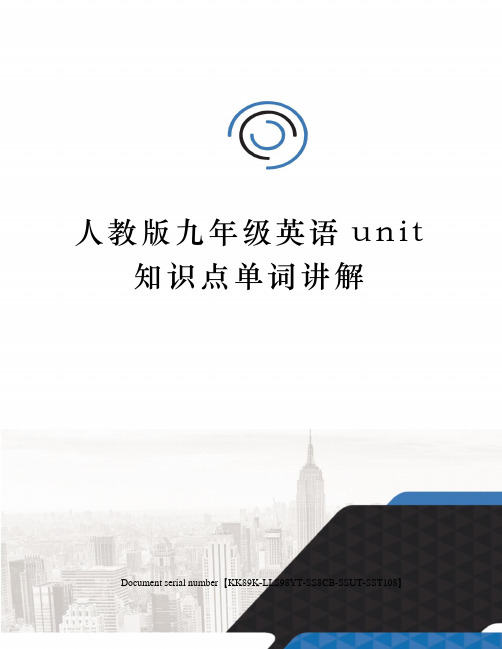
人教版九年级英语u n i t 知识点单词讲解Document serial number【KK89K-LLS98YT-SS8CB-SSUT-SST108】人教版新目标英语9年级全册讲解-Unit 2Unit 2 I used to be afraid of the dark.重点、难点、考点及疑点注释1. Over here! Don’t you remember me (P11)过来!你不记得我了吗(1)over here相当于come over here,意为“过来”。
(2) remember的反义词是forget,两者用法相同,后面可跟名词,动名词或动词不定式。
◎remember/forget doing sth表示“记得/忘记做过某事”,强调事情已经做了。
I remember posting your letter. 我记得替你寄过信了。
They forget locking the door. 他们忘记锁过门了。
◎remember/forget to do sth表示“记得/忘记去做某事”,强调事情还未做。
I remember to post your letter. 我记得替你寄信。
They forget to lock the door. 他们忘了锁门。
2. You’re Paula, aren’t you (P11)你是波拉,对吗这是一个反意疑问句,表示说话人提出某种情况或看法,询问对方是否同意。
知识拓展反意疑问句主要有以下几种类型:(1)主句为肯定陈述句时,附加疑问句为:系动词/情态动词/助动词的否定(缩写)形式+主语。
The girl went to school late yesterday, didn’t she?昨天那个女孩上学迟到了,是吗?(2)主句为否定陈述句(包括肯定形式中有never, seldom, hardly, few, little,nobody等否定意义的词)时,附加疑问句为:系动词/情态动词/助动词的肯定形式+主语。
人教版九年级英语unit5知识点,单词讲解
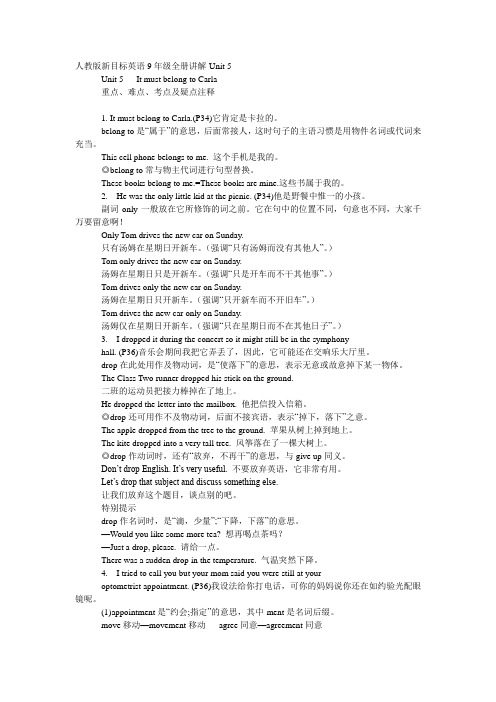
人教版新目标英语9年级全册讲解-Unit 5Unit 5 It must belong to Carla重点、难点、考点及疑点注释1. It must belong to Carla.(P34)它肯定是卡拉的。
belong to是“属于”的意思,后面常接人,这时句子的主语习惯是用物件名词或代词来充当。
This cell phone belongs to me. 这个手机是我的。
◎belong to常与物主代词进行句型替换。
These books belong to me.=These books are mine.这些书属于我的。
2. He was the only little kid at the picnic. (P34)他是野餐中惟一的小孩。
副词only一般放在它所修饰的词之前。
它在句中的位置不同,句意也不同,大家千万要留意啊!Only Tom drives the new car on Sunday.只有汤姆在星期日开新车。
(强调“只有汤姆而没有其他人”。
)Tom only drives the new car on Sunday.汤姆在星期日只是开新车。
(强调“只是开车而不干其他事”。
)Tom drives only the new car on Sunday.汤姆在星期日只开新车。
(强调“只开新车而不开旧车”。
)Tom drives the new car only on Sunday.汤姆仅在星期日开新车。
(强调“只在星期日而不在其他日子”。
)3. I dropped it during the concert so it might still be in the symphonyhall. (P36)音乐会期间我把它弄丢了,因此,它可能还在交响乐大厅里。
drop在此处用作及物动词,是“使落下”的意思,表示无意或故意掉下某一物体。
The Class Two runner dropped his stick on the ground.二班的运动员把接力棒掉在了地上。
人教版九年级英语各单元难点概括
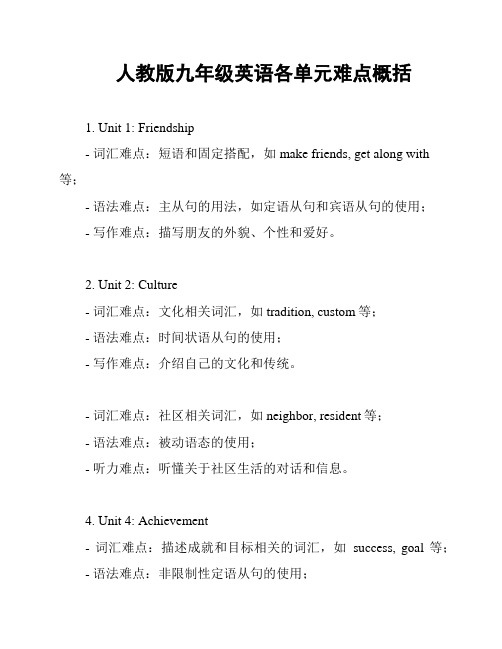
人教版九年级英语各单元难点概括1. Unit 1: Friendship- 词汇难点:短语和固定搭配,如make friends, get along with 等;- 语法难点:主从句的用法,如定语从句和宾语从句的使用;- 写作难点:描写朋友的外貌、个性和爱好。
2. Unit 2: Culture- 词汇难点:文化相关词汇,如tradition, custom等;- 语法难点:时间状语从句的使用;- 写作难点:介绍自己的文化和传统。
- 词汇难点:社区相关词汇,如neighbor, resident等;- 语法难点:被动语态的使用;- 听力难点:听懂关于社区生活的对话和信息。
4. Unit 4: Achievement- 词汇难点:描述成就和目标相关的词汇,如success, goal等;- 语法难点:非限制性定语从句的使用;- 阅读难点:理解关于成功人士的文章和资料。
5. Unit 5: Environment- 词汇难点:环境保护相关词汇,如pollution, recycling等;- 语法难点:情态动词的使用;- 写作难点:写一篇关于环境保护的文章。
6. Unit 6: Entertainment- 词汇难点:与娱乐相关的词汇,如concert, performance等;- 语法难点:直接引语和间接引语的转换;- 听力难点:听懂有关娱乐活动的对话和信息。
7. Unit 7: Technology- 语法难点:虚拟语气的使用;- 阅读难点:理解关于科技发展的文章和报告。
8. Unit 8: Health- 词汇难点:与健康相关的词汇,如exercise, diet等;- 语法难点:情态动词和情态动词的一般疑问句;- 听力难点:听懂与健康生活方式相关的对话和广播。
9. Unit 9: Future- 词汇难点:与未来相关的词汇,如dream, plan等;- 语法难点:虚拟语气的运用;- 写作难点:描述自己的未来计划。
- 1、下载文档前请自行甄别文档内容的完整性,平台不提供额外的编辑、内容补充、找答案等附加服务。
- 2、"仅部分预览"的文档,不可在线预览部分如存在完整性等问题,可反馈申请退款(可完整预览的文档不适用该条件!)。
- 3、如文档侵犯您的权益,请联系客服反馈,我们会尽快为您处理(人工客服工作时间:9:00-18:30)。
重点、难点、考点及疑点注释1. I don’t think twelve-year-olds should be allowed to get their ears pierced. (P18)我认为不应该允许12岁的孩子穿耳孔。
(1)当主句的主语是第一人称I或we,谓语动词是think, believe, suppose, guess等词时,其后的从句不能是含有not的否定句;若要否定,须将not提到主句。
在翻译时,按汉语习惯译作否定从句。
例如:“我想他不会给你打电话的”应译为I don’t thi nk he will give you a call而不是I think he won’t give you a call。
特别提示若把此类句式变成反意疑问句,其助动词及主语要根据从句确定,而肯定/否定则要根据主句来确定。
We think you can help him, can’t you? 我们认为你能帮助他,不是吗?I don’t think he is a good student, is he? 我认为他不是个好学生,对吗?(2)本句中的twelve-year-olds相当于twelve-year-old teenagers,意为“12岁的孩子/年轻人”。
知识拓展数词和一个相应的名词单数用“-”连接起来,可以构成一个合成形容词。
常见的还有:two-month holiday 两个月的假期a sixty-pound stone 一块60磅的石头(3)get their ears pierced属于“get+名词/代词+动词的过去分词”结构,表示“使……被做”,“请人做……”。
Go and get your hair cut! 你去理理发吧。
Why haven’t you g ot the work done yet? 你为什么还不叫人把活干了呢?2. I disagree. (P19) 我不同意。
I agree. (P19) 我同意。
(1) agree意为“赞成,同意”,用来表示同意某人的意见、观点等;可以单独使用,也可以接由with, to, on等引导的介词短语或接从句。
— Shall we go to the zoo tomorrow? 我们明天去动物园,好吗?— I agree. 我同意。
I quite agree with you. 我完全赞成你的意见。
Do you agree on this plan? 你同意这个计划吗?知识拓展agree with, agree to和agree on都表示“同意”,但用法不同。
◎ agree with表示“同意”,后面接表示人的名词或代词,也可以接表示“意见,看法”的名词。
We all agree with him. 我们都同意他的意见。
Do you agree with my ideas? 你同意我的观点吗?◎ agree to表示“同意”,后面接表示“计划,建议,安排”等的名词,接动词原形时构成动词不定式结构。
He agreed to our plan at last. 最后他同意了我们的计划。
They agreed to come on Monday. 他们同意星期一来。
◎ agree on表示“(两人以上)就……取得一致意见,在……方面意见一致”,其主语多为复数形式,宾语是表示事、计划等的名词,而不是表示人的名词或代词,它可以与agree in doing sth.替换。
They agreed on the plan.= They agreed in doing the plan. 他们对这个计划意见一致。
特别提示agree with也可以表示“某人适应(食物、气候等)”。
The weather doesn’t agree with me. 我不适应这种天气。
(2)disagree是agree的反义词,相当于not agree。
3. They talk instead of doing homework. (P19)他们会说话而不做作业。
本句中的instead of是复合介词,意思是“代替”,后面往往接名词、代词、动名词或介词短语, of后面的内容是被否定的。
I want that book instead of this one. 我要那本书而不是这本。
We went to swim instead of playing basketball.我们没有去打篮球,而是去游泳了。
特别提示副词instead和instead of意思相同,但用法却不同。
instead意为“代替,顶替”,常位于句首或句末,可不译。
I didn’t go to cinema. Instead, I went to go shopping.我没有去看电影,我去购物了。
The water here is not good, so I drink coffee instead.这里的水不好,所以我改喝咖啡。
4. Find someone who is allowed to stay up until 11∶00 pm. (P20) 找出被允许熬夜到11点的人。
(1) who is allowed to stay up until 11∶00 pm是一个定语从句,用来修饰前面的someone。
The man who is smoking is my father. 正在抽烟的那个人是我的父亲。
The foreigner who visited our class is from Canada.访问我们班的那个外国人来自加拿大。
(2) stay up在这里是“熬夜”,“不睡觉”的意思,相当于not go to bed。
He stayed up too late last night. 他昨天晚上熬夜到很晚。
She promised the children they could stay up for homework.她承诺孩子们可以熬夜做作业。
5. Do you ever worry that you’ll fail a test? (P21)你曾经担心过考试不及格吗?fail表示考试“不及格”或“不通过”,相当于not pass。
I think I may fail in the English exam this time. 我想这次英语考试我可能不及格。
6. Parents should not be too strict with teenagers. (P21) 父母对青少年不应该要求太严格。
形容词strict是“严格的”,“严厉的”的意思,对人严格时用介词with,对工作等严格时用介词in。
The teacher was very strict with his students. 这位老师对学生非常严厉。
He is always strict in his work. 他总是对工作要求很严格。
7. The other day, my friends and I talked about the rules that we have in school. (P22)那天,我和我的朋友们谈论我们学校的各种规章制度。
(1) the other day表示“几天以前,不久前的一天”。
I saw him in the street the other day. 不久前的一天,我在街上看到了他。
Li Ming and I went shopping the other day. 几天以前我和李明去购物了。
(3) 本句中的get to意为“开始,着手”,后面接动词的-ing形式,表示“着手或开始做某事”。
We get to working after a short rest. 我们歇息了一会儿后就开始干起活来。
He got to wondering why he was in the job.他对自己为什么会从事这份工作感到诧异。
8. We think young people should look smart and so we would like to wear our own clothes. (P22)我们想年轻人应该看起来漂亮潇洒,因此我们想穿自己的衣服。
(1) 形容词smart意为“聪明的,机敏的,精明的”,相当于clever。
The dolphin is a smart animal. 海豚是聪明的动物。
He looks very smart in his suit. 他穿上他的西装看起来很帅气。
(2) would like意为“想要”,相当于want,后面接名词或动词不定式。
I would like a cup of coffee. 我想要杯咖啡。
I didn’t want to go to the cinema. I would like to stay at home.我不想去看电影,我想呆在家里。
◎ would like sb. to do sth.表示“想要某人做某事”。
I’d like you to help me with my homewor k. 我想要你帮助我做家庭作业。
特别提示feel like也可以译为“想要”,有时可以与would like替换;其后接名词或动词的-ing 形式。
(来源:专业英语学习网站)She feels like a good meal. 她想美美地吃一顿。
I feel like seeing a film tonight. 我今晚想去看电影。
9. Our teachers believe that if we did that, we would concentrate more on our clothes than our studies. (P22)我们老师相信,如果我们那样做了,我们就会将注意力更多地集中在服装上,而不是学习上。
(1) believe是及物动词,意为“相信”,其后可跟名词或从句。
I don’t believe his story. 我不相信他的故事。
I believe he told us the truth. 我认为他告诉我们的是真的。
◎ believe in表示“信任”(即trust)。
She doesn’t bel ieve in God. 她不信奉上帝。
(2) 在that if...的句中,that放在believe后面用来引导一个宾语从句,而if则在宾语从句中引导一个条件状语从句,we would...则是宾语从句中的主句。
We are sure that if they come on time, they won’t be in the rain.我们都确信,如果他们准时到的话,就不会被雨淋了。
